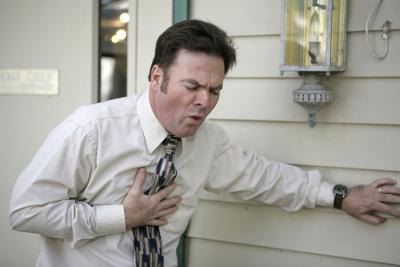Author
by
http://www.livestrong.com/article/23508-false-heart-attack-symptoms/
by
The National Institutes of Health reports that coronary heart disease that causes heart attacks is the leading cause of death in the United States. Heart disease is a result of narrowing arteries that block blood flow to the heart. Because the symptoms of a heart attack can be misinterpreted, more than half of the 1.1 million heart attack victims in America do not receive immediate medical attention and die. False heart attack symptoms can range from stomachaches to burning sensations in the chest and pain associated with other conditions such as a gall bladder attack.
Heartburn
The burning sensation in the chest that signifies heartburn can be mistaken for symptoms of a heart attack, doctors at the Mayo Clinic report. Heartburn occurs when stomach acid backs up into the esophagus and can last for a few minutes or a few hours. Heartburn pain typically occurs after eating or when lying down or bending over.
Stomachache
Unlike heartburn, a stomachache is more localized and does not cause acid to rise to the esophagus. Dyspepsia, or indigestion, however, is a common sign of a heart attack that can provide a false heart attack warning. A stomachache that includes a burning sensation in the abdomen may be interpreted as a heart attack symptom. Indigestion accompanied by nausea, bloating, belching and vomiting are heart attack symptoms that can be mistakenly diagnosed, especially when associated with a sweating, shortness of breath and a family history of heart disease.
Chest Pain
While chest pain is a primary indicator of a heart attack in progress, doctors at the University of Virginia Health System report that chest pain also could indicate a number of other conditions such as pneumonia and pleurisy. People who experience chest pain, however, should seek medical attention, especially when the pain is not relieved by rest, lasts more than a few minutes or is accompanied by abdominal discomfort that feels like indigestion.
Anxiety
The increased heart rate, palpitations and jittery stomach associated with a panic attack all can be misinterpreted as symptoms of a heart attack. Helpguide.com, a nonprofit informational resource guide, explains anxiety symptoms as fight or flight responses in the body that can mimic a heart attack. Anxiety attack symptoms also include sweating, pounding heart, nausea, shortness of breath and muscle tension.
Gall Bladder Attack
Pain associated with a gall bladder attack is sometimes confused with heart attack symptoms. The Mayo Clinic reports that gall bladder pain often moves to the chest, causing pressure and tightness. In addition, like a heart attack, the pain from a gall bladder attack often shoots to the arms, shoulders and neck. Nausea and a severe, steady pain in the upper abdomen also may accompany it, especially after ingesting a fatty meal.
http://www.livestrong.com/article/23508-false-heart-attack-symptoms/








No comments:
Post a Comment